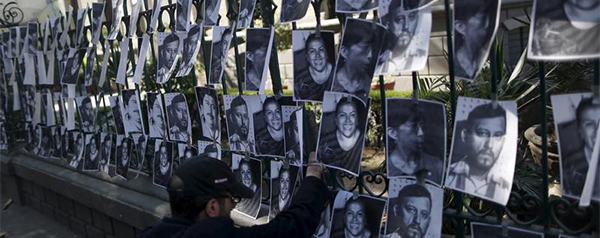Covering corruption in Mexico means living with impunity
By Adela Navarro Bello
It is a feeling of frustration that stays with you. Current affairs in Mexico today are dominated by two prevalent issues: corruption and impunity. Every story, breaking news or media report originates from these two issues. And to practice journalism here means to work in a climate of corruption and impunity. This is not fiction. It’s the essence of the country.

Those who investigate corruption and impunity risk losing their sense of comfort or, worse, their lives. And after their murders, an incomplete file is the most likely end to an investigation into their deaths. Once more, corruption and impunity.
This is not a play on words. It is not nonsense. It is the sad and deadly reality of Mexico: a byproduct of the absence of the rule of law.
Between 2006 and 2016, 21 journalists were murdered with complete impunity in Mexico, putting the country sixth on CPJ’s annual index that measures cases where perpetrators remain unpunished. The system seems to be corrupt down to its very foundation; either that or it’s simply incapable of achieving justice.
Being a journalist in Mexico means learning to live in the shadow of impunity: the impunity you investigate and report on, and the impunity experienced firsthand. The messenger risks being a victim of the story he or she investigates, at times at the hands of government officials, police commanders, common criminals, and drug traffickers who go unpunished.
At Zeta, we have experienced firsthand both the dangers of impunity and corruption and the frustration of not being able to secure justice for our slain colleagues. In the 29 years since journalist Héctor Félix Miranda was murdered, the Baja California State Attorney General’s Office hasn’t pinpointed the mastermind. And in the 20 years since the attempted murder of Jesús Blancornelas, the federal attorney general’s office hasn’t been able to prosecute and sentence a single one of the 10 perpetrators. Thirteen years have passed since the murder of our editor, Francisco Javier Ortiz Franco, with none of his murderers—be it the perpetrators or the mastermind—identified, let alone prosecuted.
As I said when accepting CPJ’s International Press Freedom Award in 2007, we will continue to do our work, to investigate, to seek the truth. But we are not heroes. And, no, we are not suicidal either. We are professionals who want to respond to the needs of an informed society.
At a time when transparency and accountability have become a priority globally, the fact that this country has lagged behind has allowed the spread of untouchable governors, wealthy police officers who bury the truth, and mercenaries at the service of the drug trade that buys protection.
Fighting this endemic corruption and impunity is not about political parties, it’s about will.
Investigating corruption in police agencies means facing a threat when there’s no room for self-censorship. This is what the Mexican press goes through every day, both small town journalists and big city reporters.
Doing it at the state level is even more dangerous. It is in the small towns, far from the nation’s capital and the reach of the federal authorities, where corruption takes root. Local entities with officials that protect each other bury justice before a federal system seemingly unable to enforce Article 7 of the Mexican Constitution: “Freedom of speech, opinion, ideas, and information through any means shall not be abridged. Said right shall neither be abridged through any indirect means, such as abuse of official or private controls over newsprint, radio electric frequencies or any other materials or devices used to disseminate information or through any other means or information and communication technologies aimed at impeding transmission and circulation of ideas and opinions.”
Fighting this endemic corruption and impunity is not about political parties, it’s about will. President Enrique Peña Nieto’s administration, just like Felipe Calderón Hinojosa’s, has lacked the commitment, the capacity, and the authority to enforce the law and to locate, investigate, and prosecute the killers of journalists. Peña Nieto’s administration rarely claims jurisdiction over investigations, so crimes against freedom of expression are not investigated at the federal level but rather at the local level. Although justice is not guaranteed in any of these jurisdictions, the federal government´s insensitivity is conspicuous, as evidenced by a backlog of cases of journalist murders throughout the country.
Mexican journalists must endure the absence of the state. Their cases are ignored, and their work is easily dismissed. They are left alone to face the onslaught by those who are corrupt and remain unpunished.
Against this lack of will and, in some regions, deep-seated corruption, the protection mechanisms offered to the press—a bullet-proof vest, a helmet, a panic button, two guards from the federal police—don’t mean anything.
Journalists are caught in the combination of corruption and impunity, brought about by an even deadlier combination: corrupt government officials and organized crime allied against the free press, against the truth exposed by investigative and critical reporting.
Being an investigative journalist in Mexico requires more than contacts, networks, qualifications, preparation, talent, and a free media outlet. It requires knowing safety practices, laws and legal proceedings, getting involved in some activism, and being willing to die for your profession.
In the path toward freedom of expression we have learned to live with impunity and to witness injustice. We appeal to the advocacy efforts of international press freedom groups so that voices unheard in our country can be heard abroad. We want justice for our dead so that the murderers of Félix Miranda, Ortiz Franco, and all of the journalists killed for their work in Mexico are prosecuted and sentenced. We want justice so that the crimes against freedom of expression—an inalienable right—do not go unpunished.